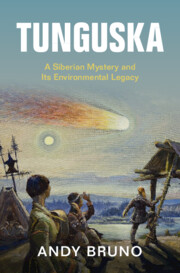
- Publisher:
- Cambridge University Press
- Online publication date:
- June 2022
- Print publication year:
- 2022
- Online ISBN:
- 9781108887847


In 1908, thunderous blasts and blazing fires from the sky descended upon the desolate Tunguska territory of Siberia. The explosion knocked down an area of forest larger than London and was powerful enough to obliterate Manhattan. The mysterious nature of the event has prompted a wide array of speculation and investigation, including from those who suspected that aliens from outer space had been involved. In this deeply researched account of the Tunguska explosion and its legacy in Russian society, culture, and the environment, Andy Bruno recounts the intriguing history of the disaster and researchers' attempts to understand it. Taking readers inside the numerous expeditions and investigations that have long occupied scientists, he foregrounds the significance of mystery in environmental history. His engaging and accessible account shows how the explosion has shaped the treatment of the landscape, how uncertainty allowed unusual ideas to enter scientific conversations, and how cosmic disasters have influenced the past and might affect the future.
Honorable Mention, 2023 ASEEES The Reginald Zelnik Book Prize, Association for Slavic, East European, and Eurasian Studies
Finalist, 2023 ASEH George Perkins Marsh Prize, American Society of Environmental History
‘In this wonderful and fascinating book, Andy Bruno unravels the mysteries and marvels of the awe-inspiring extraterrestrial event that rocked Siberia’s Tunguska region in 1908; an event we have been struggling to grasp for more than a century. Brimming with engaging prose and insightful analysis, Tunguska is at once a scientific detective story, an exploration of the cultural meanings of the cosmos and catastrophe, and a deep dive into the environmental and scientific history of the Soviet Union and beyond.’
Nicholas Breyfogle - Ohio State University
‘Professor Bruno explores the century-long quest to learn more about the vast, mysterious Tunguska fire in remote Siberia. As citizen-scientists and research teams pondered the cause of the blast, they stumbled toward an awareness of the vulnerabilities that accompany human habitation on earth. Whether it be an invasion from outer space, a catastrophic collision of earth with a meteor, the decimation of the planet from nuclear war, or the cascades of extinction accompanying a warming earth, Dr. Bruno uses the Tunguska explosion to meditate on how human societies have come to understand the mortality of not just the human species, but earth itself.’
Kate Brown - author of Manual for Survival
‘Impeccably researched and engagingly written, Tunguska is the story of a mystery-what was this event that shook people in their Siberian beds in 1908?-but also a history of how mysteries come to be. Combining environmental history and histories of science, Bruno gives us a rich portrait of an event and its afterlives.’
Bathsheba Demuth - Brown University
‘Andy Bruno explores what happened (next) with remarkable drive, energy and what he calls ‘strategic agnosticism’: a skilful weaving together of Russian and Soviet history, modern science and environmental studies that gives no approach the upper hand.’
Ethan Pollock Source: Times Literary Supplement
‘In addition to the text’s numerous merits, the reasonable price alone is enough to recommend this book to specialists in environmental, Russian, and Soviet history, as well as any student or reader interested in natural mysteries or the impact of otherworldly events on our planet.’
Garret McDonald Source: H-Environment
This book is accessibly written and includes an extensive apparatus of notes and cited sources. The work most closely fits the genre of environmental history or popular accounts of such history. Bruno's text will appeal to college-level and general readers as well as topic specialists … Highly recommended.’
J. Asselin Source: Choice
'[Bruno] probes this legendary story from several directions. His account raises an array of questions about how such a mystery can stimulate not only scientific research and environmental conservation but also fantasy, from pseudoscience to ufology to science fiction . . . Most intriguingly, the saga shows how people cope with the prospect of the end of the world.'
Sophie Pinkham Source: New York Review of Books
‘Andy Bruno's study of the 1908 Tunguska event stands at the intersection of environmental, technological and scientific histories. It also makes an important contribution to the history of Siberia and the role of this natural area in Russian and Soviet scientific history; a space that is often defined as 'frontier'.’
Eva Maria Stolberg Source: H/Soz/Kult (in German)
 Loading metrics...
Loading metrics...
* Views captured on Cambridge Core between #date#. This data will be updated every 24 hours.
Usage data cannot currently be displayed.